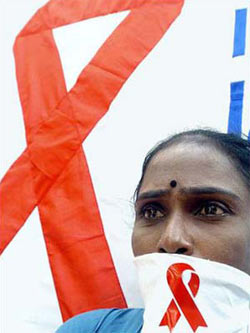Genes affecting the rate of turning to AIDS
The combination of two important genes is likely to determine whether an HIV-infected patient has developed AIDS more quickly or slower than other patients.
In a study published in the journal Nature Immunology on October 21, US scientists said the two genes were CCR5 and CCL3L1. CCR5 controls an important receptor on the surface of CD4 immune cells - where HIV virus attaches. Meanwhile, CCL3L1 controls a signaling molecule of the immune system, called chemokine, that plays a role in preventing the virus from attaching itself to the receptor.

A woman is standing in front of the banner bearing the symbol of AIDS prevention . (Photo: AFP)
According to the research team, these two genes affect the immune system in many ways, thereby deciding whether an individual is susceptible to HIV, the rate at which the AIDS phase changes and the body's response to the materials. treatment.
A beneficial or harmful combination will decide
In this latest study, medical professor Sunil K. Ahuja, of the University of Texas Health Sciences Center, and colleagues identified a number of gene-based ' risk groups ' on the combination of good or bad mutations of CCR5 and the number of versions of CCL3L1.
The combination of these two genes will affect the rate of transition from HIV to AIDS. According to Ahuja, patients with a beneficial combination of CCL3L1 and CCR5 will progress to a slower AIDS stage than those with a harmful combination of these two genes.
Experts have done gene analysis for 3,500 people, including HIV-infected patients and healthy individuals, to find out at what stage people with HIV will turn to the global condition. , then compare that stage with the gene profile and the risk group's immune response.
Speaking to AFP news agency, Mr Ahuja said: 'In terms of varying degrees in the transition to AIDS among individuals, gene variants also contribute almost equal to the number of HIV viruses'.
Hemant Kulkarni, assistant professor of medicine and co-author of the study, said: 'Even if the effects of the number of HIV viruses are excluded, those gene variants still affect speed. degree of AIDS in HIV infected people '.
Open up the opportunity to manufacture drugs according to genetic characteristics
This finding challenges the understanding of the past 25 years that the key to determining the transition from HIV infection to AIDS is the ' number of HIV viruses ' in the blood, and the increase in viral load. will weaken the patient's immune system.

Scientists believe that this study opens up opportunities to develop anti-HIV drugs or vaccines based on genetic characteristics.(Photo: AFP)
According to the research team, the number of HIV viruses in the early stages of infection only contributes 9% in the difference in the rate of transition to AIDS.
According to experts, 'the genetic characteristics of an individual can greatly affect the replication of HIV virus as well as the body's response to viral penetration'. The reaction between the virus and the immune system will cause HIV-infected people to switch from the stage of carrying the disease to the deadly stage.
Genetic profiles CCR5 - CCL3L1 also affect immune responses in healthy people. This suggests that the combination of these two genes may play an important role in the body's response to other infectious diseases.
Experts say other genes may also play a role in switching from HIV infection to AIDS.
According to the team, this finding could help find drugs or vaccines to fight HIV based on the genetic characteristics of each person or group.
According to figures from the World Health Organization, by the end of 2006, there were 39.5 million people infected with HIV or AIDS in the world.
Quang Thinh
- The new vaccine has the ability to prevent HIV / AIDS virus
- New therapies prolong the lives of AIDS patients
- HIV attacks global labor
- Detects genes that control the signal of the heart rate
- Detection of genes that control heart rate
- Successful preparation of vaccines against HIV
- Vancouver organized an AIDS campaign
- AIDS nightmare in Russia
- Australia claims AIDS is no longer a public health issue
- People who contribute specifically to AIDS research die
- Tomatoes and anti-AIDS drugs help treat cancer
- South Africa: simultaneously circumcised to fight HIV / AIDS!
 Green tea cleans teeth better than mouthwash?
Green tea cleans teeth better than mouthwash? Death kiss: This is why you should not let anyone kiss your baby's lips
Death kiss: This is why you should not let anyone kiss your baby's lips What is salmonellosis?
What is salmonellosis? Caution should be exercised when using aloe vera through eating and drinking
Caution should be exercised when using aloe vera through eating and drinking